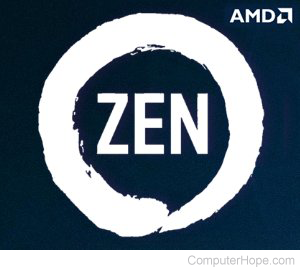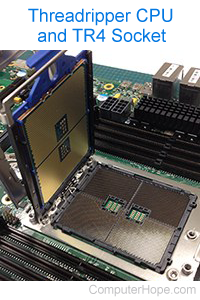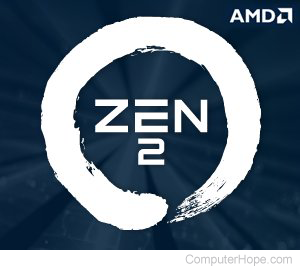Zen

Released in February 2017, Zen is a CPU (Central Processing Unit) microarchitecture designed by AMD. It is a significant redesign from previous AMD microarchitectures.
Zen supports three lines of AMD CPUs (Ryzen, Threadripper, and EPYC), each of which use a unique socket type.
An upgraded version of Zen, named Zen+, was released in April 2018. AMD has also announced plans for the next generations of the Zen architecture, named Zen 2 and Zen 3.
Zen

Features of the original Zen microarchitecture include:
- 14 nm FinFET fabrication process, permitting denser circuitry, smaller chip size, increased performance, and greater power efficiency. A 14 nm FinFET process is also used by Intel to manufacture CPUs (central processing units) beginning with their fifth-generation microarchitecture, Broadwell. In comparison, AMD's previous microarchitectures, Steamroller and Excavator, used a 28 nm process.
- SoC (System on a Chip) design. The controllers for RAM (Random-Access Memory), SATA (Serial AT Attachment), PCIe (PCI Express), and USB (Universal Serial Bus) devices are on the same chip as the CPU cores.
- An Infinity Fabric system bus.
- 50% increase in IPC (Instructions Per Cycle) over previous AMD architectures. Zen is has a maximum 16 double-precision (64-bit) IPC, or 32 single-precision (32-bit). Zen's IPC is comparable to Intel 4th–8th generation microarchitectures (Haswell through Coffee Lake).
- Precision Boost and XFR (eXtended Frequency Range) technologies monitor CPU load and temperature per core, and dynamically adjust individual core frequencies to maximize performance. The highest Zen frequency (without overclocking) is 4.2 GHz on Threadripper CPUs with XFR (Extended Frequency Range) enabled.
Zen+
Zen+ is an upgraded version of Zen, released in April 2018. It supports the next generation of Ryzen and Threadripper processors.
Zen+ features include:
- Manufacturing process reduced to 12 nm.
- Precision Boost 2 and XFR2, the next iteration of Zen dynamic frequency technologies. In Zen+, all frequency modifications are executed by Precision Boost 2, as informed by XFR2.
- Marginal increase in IPC and frequencies — maximum 4.3 GHz (without overclocking) on the Ryzen 2700X with Precision Boost 2 enabled.
Zen 2

Zen 2 is the successor to Zen and Zen+, was released on July 7, 2019. It will be manufactured using a 7 nm process and include hardware mitigation of the Spectre vulnerability announced in January 2018.
Zen 3
Zen 3 is the successor to Zen 2, also fabricated at 7 nm and was released on November 5, 2020. It is planned to support four-way SMP (Symmetric MultiProcessing), where four cores share access to RAM and cache.
Zen 4
Zen 4 is the successor to Zen 3 and released on September 27, 2022. The AMD processor uses TSMC's 5 nm process.
